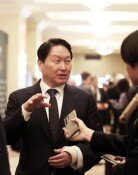[Opinion] They Call Themselves Progressives
[Opinion] They Call Themselves Progressives
Posted June. 04, 2005 06:30,
What will capitalist society in the future be like? What will the informatization end up as? Jeremy Rifkin, who is a well known social critic for his work, The Age Of Access: The New Culture of Hypercapitalism, Where All of Life Is a Paid-For Experience and End of Work, makes a dismal prediction of the future. In End of Work, which he wrote 10 years ago, information and communication technologies eventually deprive humans of work, causing serious social problems, Rifkin said. He meant that in the near future, computers might even take over human brain work. He went on to observe that the focus of capitalism would shift from possession to access.
Rifkins prediction is coming true. In the U.S. over the past 10 years, the number of jobs has shrunk by over two million, and newly created jobs are mostly low paying and temporary. Korea, too, is confronting systematic unemployment problems including youth unemployment and early retirement. In an industrialized society based on agriculture, many craved freedom from labor, but now, many feel insecure in the face of the paradoxical reality of expulsion from labor.
A few days ago, in a lecture at a university in Seoul, Minister of Labor Kim Dae-hwan deplored the situation, saying, Labor unions are the ones that lag behind the farthest in terms of change and innovation. This is because while they advocate progressiveness and cling to their cause, they do not accept the gap between the real and the ideal. His criticism was directed at those he labeled false progressives who have been exploiting the cause of social reforms to turn unions into powerful organizations and benefiting from that power. The criticism revealed the unions stated progressive ideals have some points that do not fully make sense. The ministers words sound more persuasive because he himself is a progressive official.
In Korea, the labor movement started seeking power and political clout after the historic Workers Struggle of 1987. At one point, people thought that it was an act of progressiveness to throw their weight behind labor and other social movements. In the process, the labor nobility came to exist, and they took their privileges for granted to the point that corruption became rampant. As pointed out by Kim, the current crisis of labor unions originated from the unions themselves. Now, it is time labor unions reflected on what End of Work emphasizes: co-existence and sharing.
Song Dae-keun, Editorial Writer, dksong@donga.com







